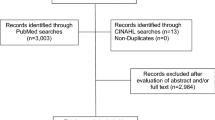Abstract
Purpose
Racial/ethnic differences in cancer symptom burden are well documented, but limited research has evaluated modifiable factors underlying these differences. Our objective was to examine the role of patient–provider interactions to help explain the relationship between race/ethnicity and cancer-specific physical well-being (PWB) among women with breast cancer.
Methods
The Pathways Study is a prospective cohort study of 4505 women diagnosed with breast cancer at Kaiser Permanente Northern California between 2006 and 2013. Our analysis included white, black, Hispanic, and Asian participants who completed baseline assessments of PWB, measured using the Functional Assessment of Cancer Therapy for Breast Cancer, and patient–provider interactions, measured by the Interpersonal Processes of Care Survey (IPC) (N = 4002). Using step-wise linear regression, we examined associations of race/ethnicity with PWB, and changes in associations when IPC domains were added.
Results
We observed racial/ethnic differences in PWB, with minorities reporting lower scores than whites (beta, black: − 1.79; beta, Hispanic: − 1.92; beta, Asian: − 1.68; p < 0.0001 for all comparisons). With the addition of health and demographic covariates to the model, associations between race/ethnicity and PWB score became attenuated for blacks and Asians (beta: − 0.63, p = 0.06; beta: − 0.68, p = 0.02, respectively) and, to a lesser extent, for Hispanic women (beta: − 1.06, p = 0.0003). Adjusting for IPC domains did not affect Hispanic–white differences (beta: − 1.08, p = 0.0002), and slightly attenuated black–white differences (beta: − 0.51, p = 0.14). Asian–white differences narrowed substantially (beta: − 0.31, p = 0.28).
Conclusions
IPC domains, including those capturing perceived discrimination, respect, and clarity of communication, appeared to partly explain PWB differences for black and Asian women. Results highlight opportunities to improve providers’ interactions with minority patients, and communication with minority patients about their supportive care needs.
Similar content being viewed by others
References
Anderson KO, Green CR, Payne R (2009) Racial and ethnic disparities in pain: causes and consequences of unequal care. J Pain 10:1187–1204
Martinez KA, Snyder CF, Malin JL, Dy SM (2014) Is race/ethnicity related to the presence or severity of pain in colorectal and lung cancer? J Pain Symptom Manage 48:1050–1059
Fisch MJ, Lee JW, Weiss M et al (2012) Prospective, observational study of pain and analgesic prescribing in medical oncology outpatients with breast, colorectal, lung, or prostate cancer. J Clin Oncol 30:1980–1988
Reyes-Gibby CC, Anderson KO, Shete S, Bruera E, Yennurajalingam S (2012) Early referral to supportive care specialists for symptom burden in lung cancer patients: a comparison of non-Hispanic whites, Hispanics, and non-Hispanic blacks. Cancer 118:856–863
John DA, Kawachi I, Lathan CS, Ayanian JZ (2014) Disparities in perceived unmet need for supportive services among patients with lung cancer in the Cancer Care Outcomes Research and Surveillance Consortium. Cancer 120:3178–3191
Walling AM, Keating NL, Kahn KL et al (2016) Lower patient ratings of physician communication are associated with unmet need for symptom management in patients with lung and colorectal cancer. J Oncol Pract 12:e654–e669
Palmer NR, Kent EE, Forsythe LP et al (2014) Racial and ethnic disparities in patient-provider communication, quality-of-care ratings, and patient activation among long-term cancer survivors. J Clin Oncol 32:4087–4094
Saha S, Arbelaez JJ, Cooper LA (2003) Patient-physician relationships and racial disparities in the quality of health care. Am J Public Health 93:1713–1719
Ngo-Metzger Q, Legedza AT, Phillips RS (2004) Asian Americans’ reports of their health care experiences. Results of a national survey. J Gen Intern Med 19:111–119
Quach T, Nuru-Jeter A, Morris P et al (2012) Experiences and perceptions of medical discrimination among a multiethnic sample of breast cancer patients in the Greater San Francisco Bay Area, California. Am J Public Health 102:1027–1034
Napoles AM, Gregorich SE, Santoyo-Olsson J, O’Brien H, Stewart AL (2009) Interpersonal processes of care and patient satisfaction: do associations differ by race, ethnicity, and language? Health Serv Res 44:1326–1344
White-Means SI, Osmani AR (2017) Racial and ethnic disparities in patient-provider communication with breast cancer patients: evidence from 2011 MEPS and experiences with cancer supplement. Inquiry 54:46958017727104
Kwan ML, Ambrosone CB, Lee MM et al (2008) The pathways study: a prospective study of breast cancer survivorship within Kaiser Permanente Northern California. Cancer Causes Control 19:1065–1076
Johnson KS (2013) Racial and ethnic disparities in palliative care. J Palliat Med 16:1329–1334
Brady MJ, Cella DF, Mo F et al (1997) Reliability and validity of the functional assessment of cancer therapy-breast quality-of-life instrument. J Clin Oncol 15:974–986
Cella D, Hahn EA, Dineen K (2002) Meaningful change in cancer-specific quality of life scores: differences between improvement and worsening. Qual Life Res 11:207–221
Tsai W, Lu Q (2017) Acculturation matters in the relation between ambivalence over emotional expressions and well-being among Chinese American breast cancer survivors. Qual Life Res 26:2755–2762
Mulvaney-Day NE, Alegria M, Sribney W (2007) Social cohesion, social support, and health among Latinos in the United States. Soc Sci Med 64:477–495
DeHaven MJ, Hunter IB, Wilder L, Walton JW, Berry J (2004) Health programs in faith-based organizations: are they effective? Am J Public Health 94:1030–1036
Bronner YL (1995) Session II wrap-up: community-based approaches and channels for controlling hypertension in blacks: barriers and opportunities. J Natl Med Assoc 87:652–655
Dirksen SR, Erickson JR (2002) Well-being in Hispanic and non-Hispanic white survivors of breast cancer. Oncol Nurs Forum 29:820–826
Acknowledgements
This study was supported by the National Cancer Institute (R01CA105274 and U01CA195565 to LHK). Dr. Check is supported by the Delivery Science Fellowship at Kaiser Permanente Northern California.
Author information
Authors and Affiliations
Corresponding author
Ethics declarations
Conflicts of interest
The authors declare that they have no conflict of interest.
Ethical approval
This research complies with the current laws of the country in which it was performed. The study was approved by the Institutional Review Board of Kaiser Permanente Northern California.
Rights and permissions
About this article
Cite this article
Check, D.K., Chawla, N., Kwan, M.L. et al. Understanding racial/ethnic differences in breast cancer-related physical well-being: the role of patient–provider interactions. Breast Cancer Res Treat 170, 593–603 (2018). https://doi.org/10.1007/s10549-018-4776-0
Received:
Accepted:
Published:
Issue Date:
DOI: https://doi.org/10.1007/s10549-018-4776-0




